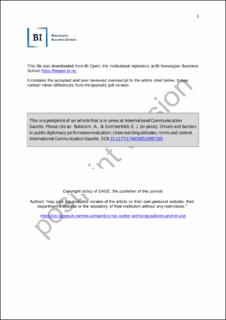Drivers and barriers in public diplomacy evaluation: understanding attitudes, norms, and control
Journal article, Peer reviewed
Accepted version

View/
Date
2019Metadata
Show full item recordCollections
- Scientific articles [2181]
Abstract
While the need for evaluation has become increasingly emphasized within the global public diplomacy community, recent research suggests the state of the practice is grim. However, the few writings that exist on evaluation practices in public diplomacy are anecdotal and focus mainly on obstacles to enacting evaluation behavior. Little is known about evaluation-related perceptions, motivations, and attitudes of public diplomacy practitioners themselves. As practitioners are under increasing pressure to deliver evaluations, understanding the perspective of practitioners and their motivations is necessary. Drawing on the theory of planned behavior, this study presents the results of interviews with 25 public diplomacy practitioners in the U.S. Department of State. The results lend insight into the attitudes, norms, and behavioral controls that influence practitioners’ intentions to engage in evaluation. The article also suggests explanations as to why evaluation struggles to gain a foothold within public diplomacy, and makes proposals for improving future practice. Drivers and barriers in public diplomacy evaluation: understanding attitudes, norms, and control